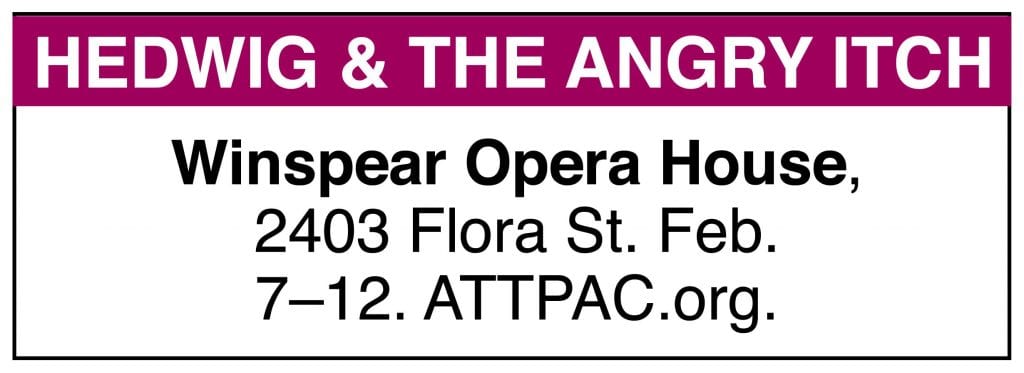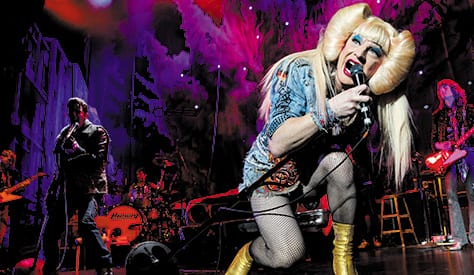Director Michael Mayer recounts how ‘Hedwig & the Angry Inch,’ a musical about an East German transgender rock star, became an unlikely smash

WIG IN A BOX | Euan Morton takes over the role of Hedwig for the national tour of the rock musical. (Photo courtesy Joan Marcus)
ARNOLD WAYNE JONES | Executive Editor
jones@dallasvoice.com
In the mid-1990s, Michael was trying to make a career for himself as a theater director — working off- and off-off-Broadway, developing shows at Juilliard, perfecting his craft. Then John, an up-and-coming actor he had worked with, told him about a play he was writing: the book for a musical (no songs were written yet) about a transgender East German rock singer and songwriter after the fall of the Berlin Wall.
It was just as crazy as it sounds. It was also brilliant.
 “After rehearsals [of a play I was directing], John would come up and read sections of it to me literally in the dressing room,” Michael now recalls. John — that would be John Cameron Mitchell — even introduced Michael (Mayer) to a songwriter named Stephen Trask, who was working on the music for a show that would eventually be called Hedwig and the Angry Inch. With Mayer’s help, the project grew and developed until they were ready to present it to potential investors.
“After rehearsals [of a play I was directing], John would come up and read sections of it to me literally in the dressing room,” Michael now recalls. John — that would be John Cameron Mitchell — even introduced Michael (Mayer) to a songwriter named Stephen Trask, who was working on the music for a show that would eventually be called Hedwig and the Angry Inch. With Mayer’s help, the project grew and developed until they were ready to present it to potential investors.
“We did a staged reading — really, a performance without costumes — at the Public Theater,” Mayer says. There were a lot of [important theater people] there … and nobody bit. It was ahead if its time, maybe.”
But all good theater stories have the moment of revelation, the sticktoitiveness that says, “The show must go on.” Eventually, a producer came onboard and Hedwig was ready to debut off-Broadway … but without Mayer.
“It timed out exactly when my first Broadway show, Triumph of Love, was happening,” Mayer says. Another director took over. And while Mayer loved what he did, Hedwig wasn’t his anymore. At least it wouldn’t be for more than a decade.
Hedwig and the Angry Inch — a rollicking two-actor, small-band musical-as-live-rock-concert — became an underground sensation, a Golden Globe-nominated film (directed by John Cameron Mitchell himself) and eventually a regional theater staple (Kitchen Dog Theater, Uptown Players and others have produced it locally). And when it was finally ready for a Broadway staging, responsibility for directing it fell to Mayer.
“When it came back to me so many years later, it felt like destiny,” he says.
The production ran on Broadway for a year-and-a-half, winning some Tony Awards and tons of loyal fans. And now, that version — Mayer’s, delayed for almost two decades — makes its full-on Dallas debut at the Winspear this week.
It’s a different show — by far — than the one Mayer worked on back in the 1990s. When he left it, there was no Yitzhak (Hedwig’s bandmate and lover), the ending was different (Hedwig singing “You Light Up My Life” in German, wearing oven mitts) and it was set in a TGIFriday’s. When it came back to Mayer, “the show existed already. It had really been finished. The only new writing related specifically to the Broadway environment.”
But Mayer — a Tony-winning go-to director for edgy Broadway shows like Spring Awakening, American Idiot and his new project, based on the music of the Go-Go’s — was the ideal choice to open up Hedwig to ensure its intimacy but also wow folks putting down money to see a pull-out-all-the-stops musical.
“The big challenge on Broadway — and taking it on tour — was taking this raw, gritty, off-Broadway experience, keeping it just as subversive and edgy, but moving it to Broadway with all the bells and whistles,” Mayer says. “The big writing change that happened was explaining how Hedwig ended up on Broadway.” (Spoiler: She gives a blowjob to the head of the Schubert Organization and takes over a theater where the failed musical version of The Hurt Locker has just closed. “Part of the greatest writing John did was around The Hurt Locker and that wacky song Steven wrote,” Mayer laughs.)
Making Hedwig site-specific — acknowledging to the audience where they are, just like at a real concert — has become part of the essence of the show on tour.
“Hedwig will always have very specific references to the actual theater and town she’s playing in — that has proven to be really fun,” Mayer says. “It lends an immediacy and an authenticity, which is what you really want in a show like this.”
Mayer himself was intimately involved in the transformation from New York to national tour, including overseeing the put-in of Tony-nominated actor Euan Morton in the title role. And anyone who has seen a production knows that not only is it a role primed for a star-turn, but each actor lends his unique imprimatur on it.
“It’s thrilling [seeing new actors as Hedwig] because you realize it wasn’t just a vanity project that happened to work because of the unique and wonderful gifts of John Cameron Mitchell as a performer, but a wonderful piece of writing that can accommodate many interpretations,” Mayer says. “It’s not unlike any iconic role. How many times can you see Hamlet? A lot! The fun of it is to see what different people bring to it. They each see something special that brings a unique experience and version.”
Devotees have Hedwigged out over each incarnation; many who saw each of the celebrity cast members in New York (Neil Patrick Harris, Taye Diggs, Michael C. Hall, Darren Criss) have followed the show on tour. There will always be a rabid fanbase, Mayer predicts, because in spite of the strange subject matter, Hedwig
reaches a lot of people.
“What actually makes it viable is, that as odd as the specifics are, the story is quite universal: This person’s search for whatever is going to integrate them and allow them to move forward. I don’t know anyone who is at least a minimally self-reflective who doesn’t find it difficult to integrate different parts of themselves. How do you move forward in life when you have some serious baggage? I think that’s why people are so jubilant at the end. My parents are not strange rock-n-roll fans, but even they put their hands in the air at the end,” he says. “That final song, ‘Midnight Radio,’ is so inclusive. It’s a very life-affirming experience.”
A Pride Night performance takes place on Feb. 9, beginning at 6:30 p.m. For more details, visit ATTPAC.org.
This article appeared in the Dallas Voice print edition February 03, 2017.

